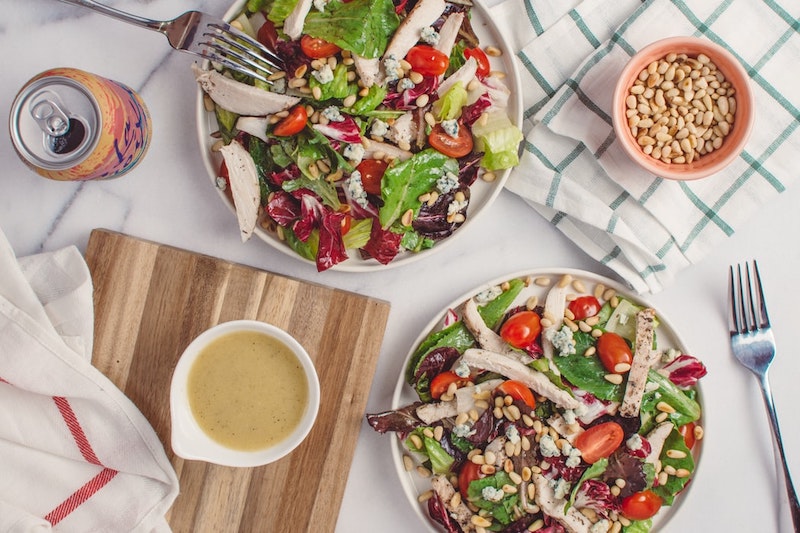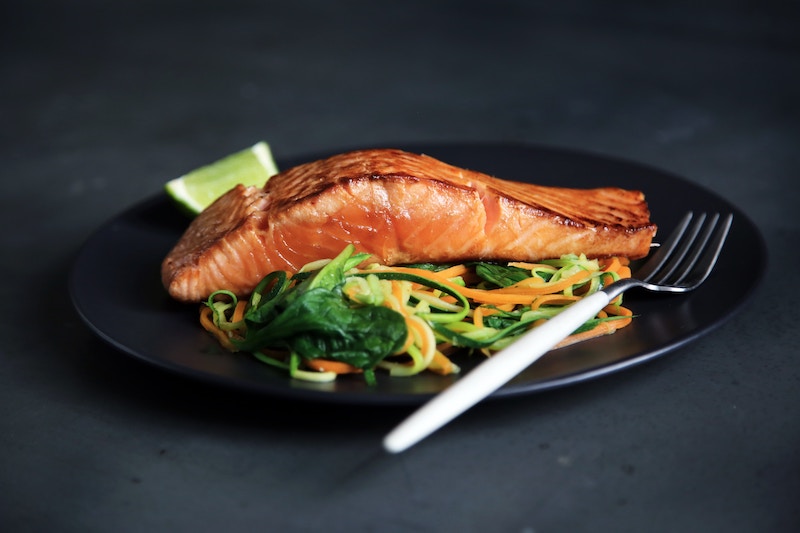
Fueling Up: What (and When) to Eat on Workdays for Optimal Health and Energy
Some people eat food because they love it. Others eat just to survive. But food allows us to thrive, and what we choose to put into our bodies is just as important as what we don’t. The choices we make for breakfast, lunch, and dinner (and even the snacks in between) impact our mood, health, and energy levels, dictating how we feel throughout the day and how productive we can potentially be. So put down that chocolate bar, pick up some carrot sticks, and keep reading to find out the best times to eat, what to eat, what to avoid, and the benefits each meal can offer you.
BREAKFAST
Best Time to Eat: Regardless of whether your alarm goes off at 5:30 a.m. or 9 a.m., experts recommend eating breakfast within an hour or two of waking up in order to jump-start your metabolism and stabilize your blood sugar. The sooner, the better!
Foods to Eat: Your goal should be to eat a meal that combines good carbs and fiber with protein. Steel-cut oatmeal, Greek yogurt, bananas, and eggs are all great options for a well-rounded breakfast.

Foods to Avoid: Consuming an unhealthy breakfast can actually be more detrimental to your health than not eating breakfast at all. Foods such as sugary cereals, muffins, and pancakes are nice treats for the weekend, but eating them on a regular basis will cause you to feel sluggish throughout the workday. Filling up on fiber-less carbs and leaving out protein won’t give you the sustained energy your body needs for a busy day and will leave you feeling hungry again within a few short hours.
Benefits: A well-timed, nutritious breakfast will provide you with the energy you need to take on the day. It gets your metabolism going after a night of rest and even assists in weight management and maintaining heart health and cognitive function. Alternatively, deciding to ditch breakfast for a morning can cause you to feel unfocused and unalert. Not exactly a good recipe for a productive day at the office.
MORNING SNACK
Best time to eat: Whenever hunger strikes, but save your appetite for lunch! Keep in mind that a healthy 100-calorie snack should help keep you full and energized for about one hour.
Foods to Eat: Almonds and other nuts contain good fats and protein, meaning they are filling and offer sustained energy. Bananas, high in potassium, can give you a nice energy boost. And you can never go wrong with veggies such as carrots and celery; not only are they low-calorie, but they will deliver your body a healthy dose of vitamins. For more snack ideas, check out our list of snacks that will help you power through the workday.
Foods to Avoid: One word: Sugar. Chocolate bars, doughnuts, potato chips, and soda are just a few examples of sugar-filled snacks that won’t give you the energy boost you are seeking. Not only will eating items such as these cause fatigue, but they also don’t improve mood or alertness.
Benefits: Choosing to eat a small, healthy snack in the morning can give you an energy boost, reduce your appetite and make you less likely to overeat come lunchtime.
LUNCH
Best Time to Eat: Listen to your body. A healthy, balanced breakfast will typically keep you full and energized for four to five hours. Eat when your body tells you that you’re hungry, but make an effort to try to stick to the same eating routine daily.
Foods to Eat: Foods that are high in fiber such as vegetables and whole grains are ideal for a lunchtime meal. A salad with protein, grain bowl or broth-based soup are all good choices.

Foods to Avoid: Stay far, far away from fast food. While drive-thrus may be convenient for a short lunch break, the greasy food that is passed to you in a paper bag through your car window is highly processed and full of salt. Frozen microwave meals are another no-go. They are filled with unfamiliar ingredients and will likely leave you feeling unsatisfied.
Benefits: Eating a high-fiber lunch will fill you up and keep you feeling full, focused and energized for the entire afternoon. Say so-long to that afternoon slump!
AFTERNOON SNACK
Best Time to Eat: Many individuals try to avoid eating an afternoon snack in the hopes that they can hold out until dinner. But, if you are starving when you leave the office for the day, you are more likely to pick up takeout on the way home or eat everything in your kitchen while cooking supper. So, when you start to feel a bit groggy or your stomach starts to growl, don’t hesitate to reach for a snack, even if dinnertime is nearing.
Foods to Eat: An apple or banana with nut butter, dates, cheese, or plain popcorn are all healthy options for a snack that will keep you feeling full until dinner is ready.
Foods to avoid: Coffee. Or, more broadly, any highly caffeinated food or drink. Unless you want to spend the afternoon typing with jittery hands, pass on the java or opt for decaf.
Benefits: A nutritious afternoon snack will help keep you focused on work for the remainder of the day and will prevent you from binging on food in your pantry as soon as you arrive home.
DINNER
Best Time to Eat: Ideally, it’s recommended to eat dinner at least three hours before going to bed to allow time for digestion before lying down for the night. According to experts, going to sleep with a full stomach means your body will have to use energy throughout the night to digest it, leaving you feeling tired the next morning.
Foods to Eat: You can’t go wrong with a serving of vegetables with protein such as salmon or beans. Adding some whole grain pasta is also ok, as long as it’s in moderation.

Foods to Avoid: Eating certain foods in the evening can cause heartburn and prevent you from getting a good night’s sleep. Meals with lots of carbs, spicy foods, and greasy, fatty foods should be limited this time of day as they are difficult to digest and are hard on your gastrointestinal tract. As tempting as a piece of chocolate cake is for dessert, keep in mind that it contains caffeine that can make it difficult to fall asleep. Likewise, red meat tends to increase adrenaline and could keep you up past your bedtime.
Benefits: Eating a nutritious dinner a few hours before bed will keep your metabolism going, give your body fuel for the day ahead, and prevent midnight snacking.
Tyme’s Office Food Program prioritizes employee wellness, offering delicious and nutritious lunch options every day. Start your free trial now!
Our Office Snack Program makes it easy to bring healthy, premium snacks to your office. Request your free sample today!
